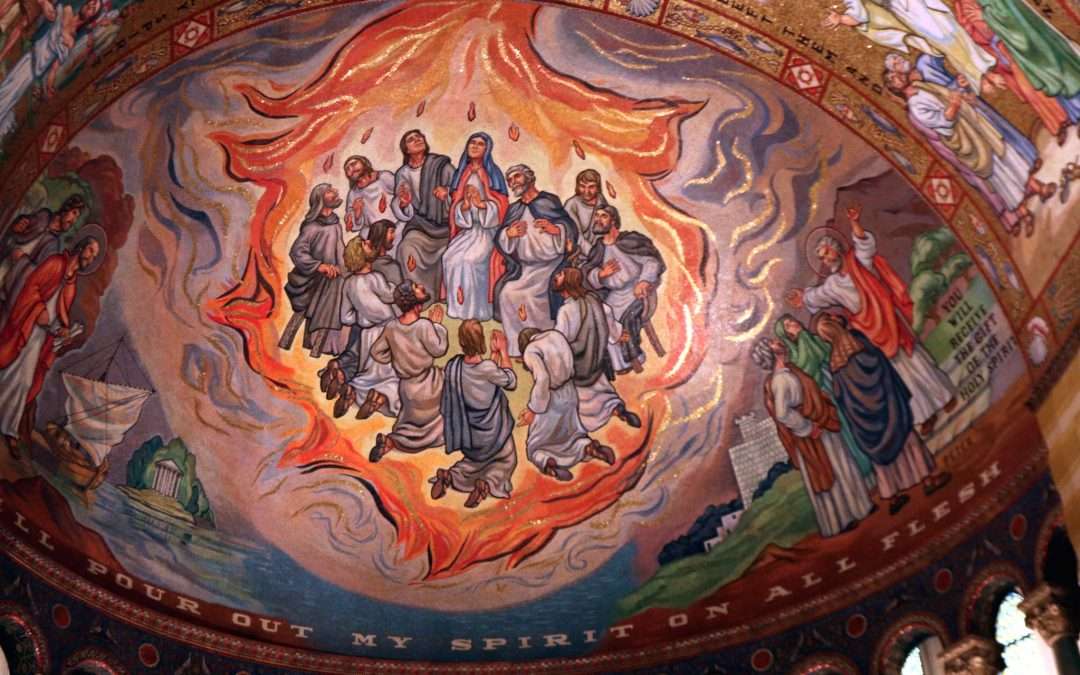The following article is condensed from a talk Ralph gave during the Renewal Ministries’ Pentecost Mission, available on our YouTube Channel.
Every pope since St. John XXIII has fervently called for a new Pentecost. In 1962, he asked the entire Church to pray that the Lord would renew his wonders in our day “as by a new Pentecost.” He wanted the power of God to rejuvenate, enliven, and empower the Church—and connect us more vigorously with God.
Pope Paul VI asked, “What is the primary and ultimate need of our beloved and holy Church? This need is the Spirit. The Church needs her eternal Pentecost. She needs fire in her heart, words on her lips, a glance that is prophetic.” Pope John Paul II said, “This passion will not fail to stir in the Church a new sense of mission which cannot be left to a group of specialists but must involve the responsibility of all the members of the people of God.”
When Pope Benedict XVI visited New York City, he said something very strong—but in such a gentle voice, people didn’t get the power of what he was saying: “Let us implore from God the grace of a new Pentecost for the Church in America. May tongues of fire, combined with burning love of God and neighbor, with zeal for the spread of Christ’s kingdom, descend on all present.”
Pope Francis encouraged those present at the fiftieth anniversary of the Catholic Charismatic Renewal (CCR) in Rome to “share the grace of being baptized in the Spirit with the whole Church.” Later, he asked priests’ conference attendees to pray for him to receive more of the Holy Spirit. For us, too, there is more of the Holy Spirit. There’s more for the new time we’re facing in the Church; there’s more for what we’re facing in our own lives. The apostles had already received the Holy Spirit, but when they faced persecution, they prayed for more of the Holy Spirit to help them (see Acts 4). We also are entering a time of persecution, and we also need more.
John the Baptist speaks of Jesus as the one who will baptize in the Holy Spirit. He calls people to show the fruit of repentance: “Even now, the ax lies at the root of the trees. Therefore, every tree that does not bear good fruit will be cut down and thrown into the fire. I am baptizing you with water for repentance but the one who is coming after me is mightier than I. I am not worthy to carry his sandals. He will baptize you with the Holy Spirit and fire. His winnowing fan is in his hand. He will clear his threshing floor and gather his wheat into his barn, but the chaff he will burn with unquenchable fire” (Mt 3:10-12).
When Jesus was presented at the temple, Simeon said He would be the cause for the rise and fall of many, that He would reveal the secrets of hearts and be a sign of contradiction (Lk 2:28-35). John the Baptist echoes that here: When Jesus comes close, there’s a choice to be made. We need to surrender ourselves and be baptized in the Holy Spirit, or there’s a grave danger of distancing ourselves from the Lord, of not surrendering wholeheartedly, and the risk of judgment.
Before his Ascension, Jesus said, “You are witnesses of these things, and behold, I am sending the promise of my Father upon you, but stay in the city until you are clothed with power from on high” (Lk 24:48-49). This is significant. They’ve had the best teaching, spiritual direction, and Bible study that anyone has ever had. And yet Jesus knows they don’t have what they need for it all to come together and ignite a fire in their hearts.
Correct doctrine, orthodoxy, and proper and reverent celebration of the liturgy are all essential—but not enough. Jesus refers to “power from on high”— an energy, a power, a person living within us. Jesus said the Holy Spirit is going to come, and He’s going to allow the Father and Jesus to dwell in you, speak to you, remind you of things, guide you, and give you power to be a witness.
There is a visibility to Pentecost—things you can see, hear, and observe. When bystanders said they must be drunk, Peter said they weren’t. He told them about Jesus’ crucifixion and resurrection and how He now sits at the right hand of the Father, pouring out the Holy Spirit. Peter’s pointing to something visible, something that’s happened, something that’s changed. They’re speaking in tongues, praising God, glorifying God, and proclaiming the truth.
“When the people heard this, they were cut to the heart and said to Peter and the other apostles, ‘Brethren, what shall we do?’” (Acts 2:37) Why did they respond that extraordinary way? Because Peter was preaching with the power of the Holy Spirit and the anointing of God. Peter was speaking boldly, courageously, directly, authoritatively, and there was an anointing on his preaching that pierced their hearts. May that be more and more the case today as the fire of the Holy Spirit falls on us and we become more bold in our proclamation, more anointed in our obedience to the Lord.
Peter replied, “Repent and be baptized every one of you for the forgiveness of your sins, and you will receive the gift of the Holy Spirit. The promise is for you and your children, and for all who are far off, for all whom the Lord will call to Himself” (Acts 2:38-39).
This is the definitive papal interpretation of Pentecost. People often have said that what happened on Pentecost was special, but that was just to get the Church started, and we don’t really need that today. Other theologians have said, “Pentecost was very important, but that’s for the leaders and saints, not for ordinary people.” That’s not true. God created the human race to be one with Him, and the only way we can be one with Him is to repent and believe for the forgiveness of our sins, be baptized, and receive the Holy Spirit.
Peter pleads with them, “Save yourselves from this corrupt generation” (Acts 2:40). This certainly continues to be true today. The world is becoming a place where demons are in control—a place of bondage, brainwashing, and oppression. We need to save ourselves by fully embracing Jesus Christ—every word He speaks—and by falling at his feet and saying, “Jesus, You are Lord.” We can’t say those words with understanding, sincerity, fervor, and conviction, unless the Holy Spirit illumines to us who Jesus really is and moves us to surrender to Him (1 Cor 12:3). May we all do so.
The Catechism of the Catholic Church says one way Pentecost is perpetuated is through the Sacrament of Confirmation. Sadly, for many young people today, Confirmation is merely the last thing they must do before they can stop going to Church. Grace is given in the sacrament, but unless there is a receptivity to the sacrament, it won’t necessarily bear fruit. Too often, Confirmation is not perpetuating Pentecost in the lives of those receiving it.
When the apostles learned that the Holy Spirit had “not yet fallen upon any of” a new group of believers, they prayed with them to receive the Holy Spirit (Acts 8:14-16). Obviously, they had the Holy Spirit if they were baptized in the name of the Lord Jesus, but something more was supposed to happen.
The Lord then called Peter to go into the household of a Gentile to speak about Jesus, revealing that He came for everybody (Acts 10). While Peter was speaking to Cornelius about what happened to Jesus and how He died and rose from the dead for us, “The Holy Spirit fell upon all who were listening to the Word. The circumcised believers who had accompanied Peter were astounded that the gift of the Holy Spirit should have been poured out upon the Gentiles, for they could hear them speaking in tongues and glorifying God. Then Peter responded, ‘Can anyone withhold the water for baptizing these people who have received the Holy Spirit even as we have? And he ordered them to be baptized in the name of Jesus Christ’” (Acts 10:44-48).
There’s a recognition that what happened to Cornelius and his household was the same thing that happened to the disciples on the day of Pentecost. Almost universally, a gift of the Holy Spirit is glorifying God: praise; jubilation; rejoicing; and the joy that comes from knowing the Lord, the forgiveness of sins, and God’s love poured into our heart through the Holy Spirit.
Jesus said the Holy Spirit would remind us of what Jesus said—and we need that. Often, when we’re in a situation, the Word of God will be recalled to our mind, and we’ll understand something about the situation we’re in. We need the Holy Spirit to remind us of what Jesus has said, which means that we know the Word of God to some extent, so the Holy Spirit has something to remind us of.
I remember the word of the Lord, how he said John baptized with water, but you will be baptized with the Holy Spirit. If then God gave them the same gift he gave to us when we came to believe in the Lord Jesus Christ, who was I to be able to hinder God? When they heard this, they stopped objecting and glorified God saying, “God has then given life-giving repentance to the Gentiles” (Acts 11:16-18).
There’s so much here. Peter says, “If God gave them the same gift he gave to us when we came to believe in the Lord Jesus Christ.” Did the disciples first come to believe in Jesus when they received the Holy Spirit on Pentecost? Yes and no. Before, they sort of believed in Jesus, but not enough to stay at the cross or to not fear the Jews. They didn’t yet have the depth of conviction to proclaim Him—but Jesus told them not to even try until they received the Holy Spirit. When they received the Holy Spirit, they understood who Jesus was. They understood that all power and authority had been given to them, and they were being sent out on a mission. There are a lot of Catholics today who sort of believe in Jesus. Maybe they even believe correct doctrine about Jesus, but it hasn’t been ignited in their heart to give them a desire to praise, glorify, or witness to Him.
The disciples rejoiced that, “God has then granted life-giving repentance to the Gentiles too” (Acts 11:18). Repentance is life-giving. Refusal to repent—holding on to our sins, disordered attachments, and unbelief—deadens the soul and risks eternal death. There’s a joy that comes from acknowledging the truth about our lives and asking for forgiveness.
In Acts 19, Paul asks an unusual question of a group of disciples: “Did you receive the Holy Spirit when you believed?” The disciples respond, “We never even heard that there is a Holy Spirit.” They had been “baptized by the baptism of John the Baptist.” Paul tells them John wanted his disciples to believe in Jesus—he was preparing the way for Jesus. When they heard the truth spoken in love and the power of the Holy Spirit, they were baptized in the name of Jesus, and when Paul laid his hands on them, the Holy Spirit came upon them, and they spoke in tongues and prophesied.
Why did this Pentecost-like experience stop happening as new converts came into the Church? After the Church became legally accepted, evangelization became very different—more institutional, bureaucratic, and conventional. Many people entered the Church for reasons other than personal conversion. In missionary territories and in the lives of the saints, there’s often been a greater manifestation of the Holy Spirit.
It’s important to stir up the gifts of the Spirit. Jesus said, “If you deny me before men, I will deny you before my Father in heaven” (Mt 10:33). That’s in the context of persecution. We’re again entering a time where there’s pressure to not identify ourselves as Christians, to not defend the truth about marriage and family life, to not say Jesus is the only way to the Father. There’s a lot of pressure for us to be silent about or even deny who Jesus is, what it means to follow Him, and how the whole human race is called to faith in Jesus and repentance. We need to be strengthened so we don’t deny Christ. We need the power of the Holy Spirit in order to be faithful witnesses to Him even in a time of persecution.
When believers were threatened with persecution, they prayed for boldness (Acts 4:29-30). We need to fan into a flame the graces we received at baptism and confirmation. According to St. Thomas Aquinas, sometimes there also is a new sending of the Spirit that the Lord wants to give us when a new mission or phase of life opens up. Let’s consider whether the Lord has more for us as we’re facing the new situation in the world and the Church today.
Let’s ask the Lord to send us more of his Holy Spirit—who Pope Benedict XVI calls “the ultimate thirst of man”: “He alone is the fresh water without which there is no life. He is God’s gift. He is God sharing Himself with man. He is the only gift worthy of God. That is why Christian prayer does not beg for just anything; rather, it begs for the gift of God, that is, God Himself. It begs for Him.”
This doesn’t mean we all have to join a movement. Cardinal Suenens said the Catholic Charismatic Renewal is a witness in the Church to what belongs to the whole Church. Like Peter said on Pentecost: this is for you, it’s for your children, it’s for everybody who God is drawing to Himself. It happened for me on the last day of a Cursillo retreat I made when I was a senior at Notre Dame. I’d never heard of baptism in the Spirit, but as I opened my heart to the Lord, repented, and surrendered, the fire of God’s love came into my soul. Other people have experienced this on Ignatian retreats, and there are various movements of renewal now that are helping people. I’m not asking you to join a movement; I’m asking you to join The Mover—to join the Holy Spirit and ask for Him to be released into your soul.






